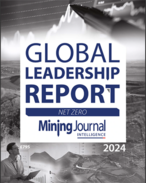This article is 5 years old. Images might not display.
Last updated in 2003, the ICMM's ‘10 Principles' have been revised to include "site-level validation and transparent disclosure", in order to "maximise … benefits to host communities and minimise negative impacts", according to a statement.
Validation will cover all member assets - roughly 650 operations representing a quarter of metal production worldwide by value - and is to be determined through a combination of "self-assessments and independent third-party assessments, coupled with transparent disclosure of the outcomes".
The ICMM said the principles aligned with other responsible sourcing initiatives.
It is the second leading metals institution to implement higher standards for mined materials in a matter of months, following the London Metal Exchange's release of its responsible sourcing rules in October last year, which fall into step with OECD responsible sourcing guidance.
The ICMM has been criticised by some stakeholder groups for its limited response to repeated environmental and social failures perpetrated by member companies. A visible effort to improve, and more importantly enforce, best practice would be seen by many as a necessary step.
The publication of these principles precedes the impending release of findings from a global tailings storage facility (TSF) review, which has been co-convened by the ICMM, Principles for Responsible Investment and the United Nations, and was established following the Feijão (Brumadinho) TSF failure in Brazil that killed more than 250 people. That TSF was managed by major iron ore miner and ICMM member, Vale. It followed the failure of the Fundão (Samarco) TSF in November 2015, which was a joint venture between Vale and fellow ICMM member, BHP.
At a company level, management teams would likely welcome a set of guidelines offering clear best practice standards, which might help navigate the increasing number of ESG criteria being issued by investors and demanded by civil society groups and other NGOs.
ICMM chief operating officer Aidan Davy took the opportunity to underline the role mining and metals played in "sustainable social and economic progress" and in providing the raw materials needed to fight climate change, with the caveat that supply of those raw materials had to be done responsibly.
"Societal expectations of the mining industry encompass a broad range of environmental, social and governance challenges," he said. "Our aim has been to develop a holistic set of requirements that establish a benchmark for responsible mining practices."
More detail of the principles can be found here. An explanatory video is here.























